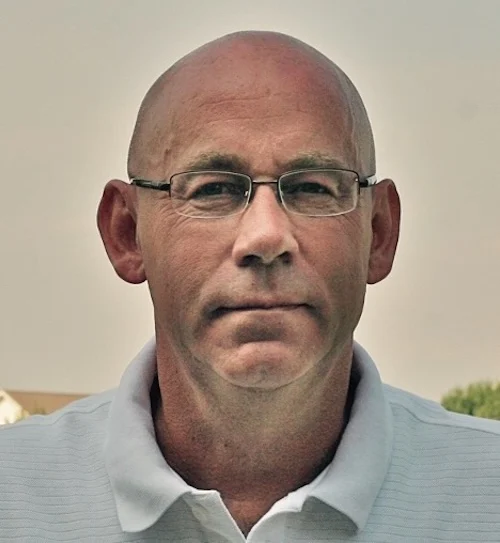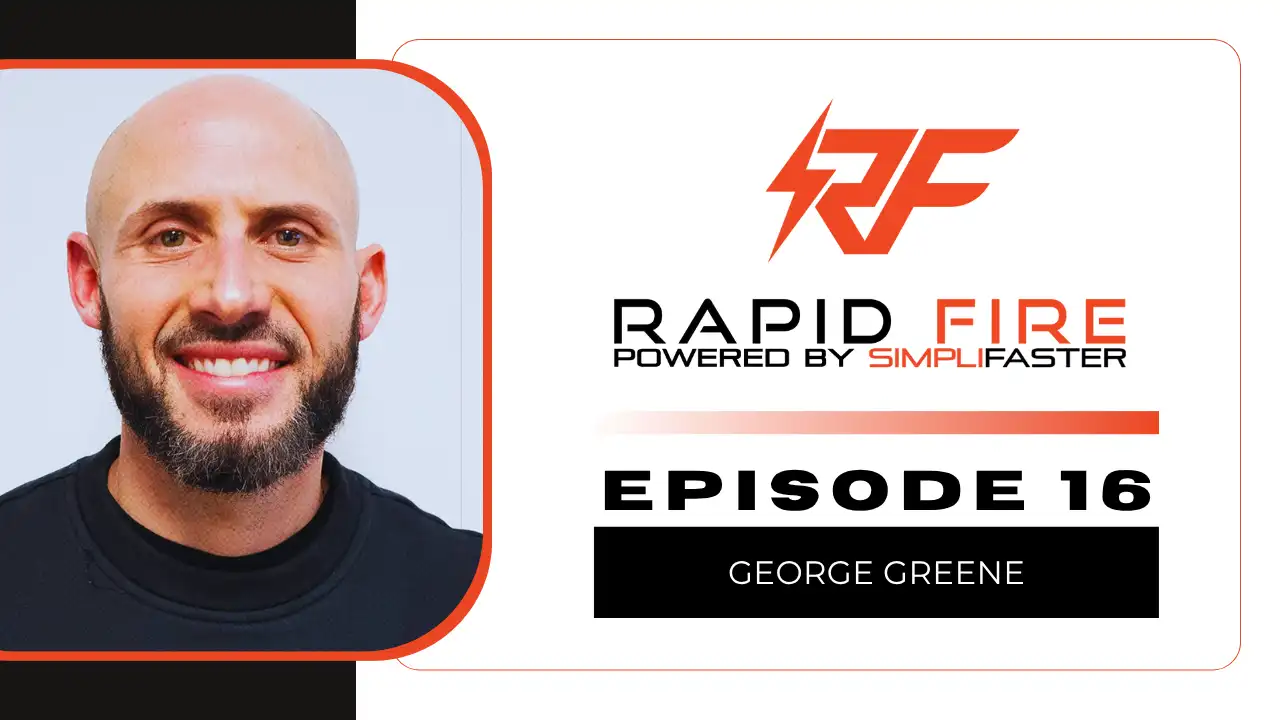[mashshare]

I love the definition of consortium: “An alliance, partnership, or coalition of people pooling resources for a common goal.”
That’s it! That’s what our consortium is all about. Our common goal? Speed.
“I recruit slow kids,” has never been said by any coach in the history of football or track. Speed is universally revered.
Finding speed and training speed are not the same. Recruiting fast kids should be the number one goal for football and track coaches. However, once you get fast kids, what are you going to do with them?
Chris Korfist and I are speed coaches seven days a week. Our lives have become a quest to improve a skill that has been a part of the human experience since ancient times. Chris and I both have deep roots in football. We have assembled an incredible lineup of speakers for the benefit of coaches and athletes in multiple sports. Without question, the Track Football Consortium is unlike any clinic you’ve ever attended.
Here are my five reasons to attend TFC-4.

Stuart McMillan of ALTIS
Stuart is best known today as a sprint coach. One of his athletes is Andre De Grasse, the 21-year-old darling of the 2016 Rio Summer Olympics where he won one silver and two bronze medals, proving himself the heir-apparent to Usain Bolt.
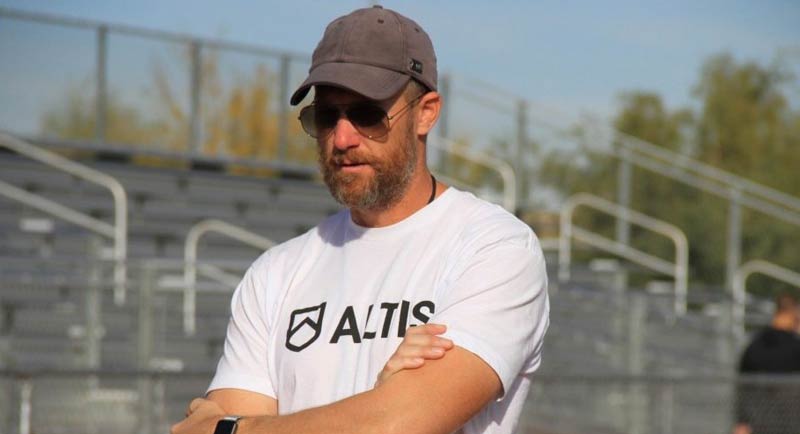
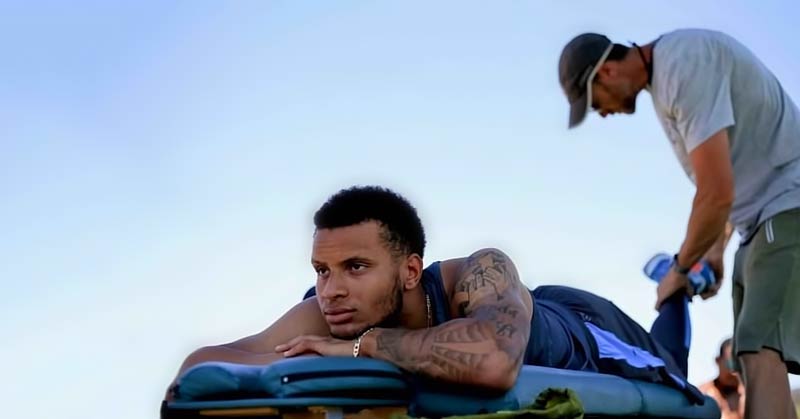
In addition to Andre De Grasse, Stuart has worked with the following world-class sprinters:
- Ameer Webb, USA
- Dwain Chambers, UK
- BeeJay Lee, USA
- Wilfried Koffi, Ivory Coast
- Marlon Devonish, UK
- Christian Malcom, UK
- Akeem Haynes, Canada
- Jeremy Dodson, Samoa
- Curtis Mitchell, USA
- Schillonie Calvert, Jamaica
- Jodie Williams, UK
- Ella Nelson, Australia
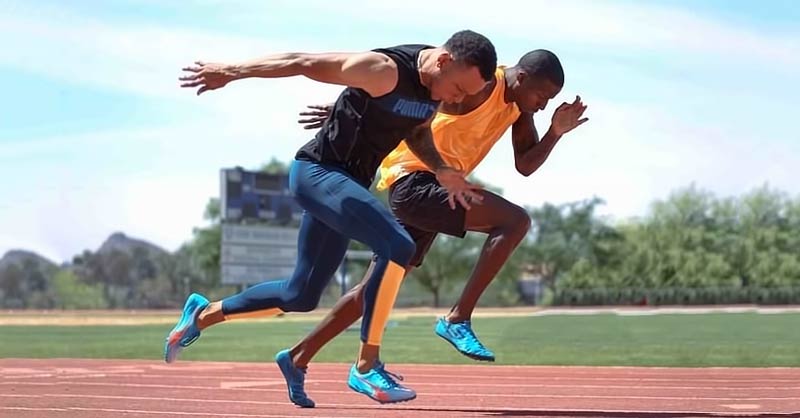
Stuart also is very proud to have coached Kaillie Humphries and Elana Taylor. Humphries (Canada) won gold medals in the women’s bobsled in 2010 and 2016. Taylor (USA) won silver in the women’s bobsled in 2014 and bronze in 2010.
In his early years, Stuart made his mark as a strength and conditioning coach in Calgary, Canada, and Newcastle, England. He has since spent his time working with Olympic bobsled athletes, soccer athletes, NFL football players, and professional athletes of all types.
Stuart McMillan, alone, may be enough to sell TFC-4 to coaches everywhere, but I have four more reasons to attend.

Speed: The Most Neglected Skill
Bear Bryant said, “Luck follows speed.”
Speed is a priority in football and many other sports. Football coaches love speed, but most treat it as a genetic trait, not a skill. Do some football coaches recruit speed and then neglect it?
Anyone who coaches modern football with old school methods should consider attending TFC-4. Modern football is a game played at breakneck speed. Football players of the past were big and bulky and wore big bulky pads.
Today, sprinters dominate games wearing tights and almost undetectable shoulder pads.
In a recent interview, Josh Bonhotal, Director of Sports Performance for the Purdue men’s basketball team and presenter at TFC-4, described a mistake made by coaches everywhere.
“Too often, I see coaches overemphasizing conditioning during the offseason and never developing absolute capacities of strength, power, and speed. In particular, a common mistake is to attack repeat sprint ability when you have never truly developed speed and thus sprint ability itself,” Bonhotal said.
Are some high school football players faster on Monday than Friday? Practice is a grind. Football coaches demand full speed on every rep, every day. If you’re a football coach whose team is faster on Friday, I want to meet you.
Speed is the key to modern football, but too many football practices look more like boot camp than track practice. If “playing fast” is your mantra, speed considerations should be the lynchpin of weekly practice.
Do all track coaches understand speed development? I don’t think so. Too many track coaches are addicted to lengthy practices with heavy emphasis on strength, conditioning, and general fitness. The same coaches are fearful of max-speed sprinting in practice. Some track programs never spike-up and sprint. They just run and run and run.
Too many track programs have a distance coach at the helm. Sprinters are often seen as soft and lazy because they require so much rest and recovery to grow faster. Daily practice and consistent hard work are keys to distance running. Many coaches make the mistake of holding sprinters to the same standard as distance runners.
Many coaches make the mistake of holding sprinters to the same standard as distance runners. Share on XDon’t get me started on the typical weight room program. Arbitrary lifts. Arbitrary sets and reps. Many in the weight room don’t seem to understand the difference between bodybuilding and speed development.
Many coaches are addicted to the process. When process trumps content, performance suffers. What’s more important, ten hours of terrific football practice or an amazing game on Friday night? It’s the content that matters most, not the process. There’s no magic in ten hours of practice. Content must drive the process.
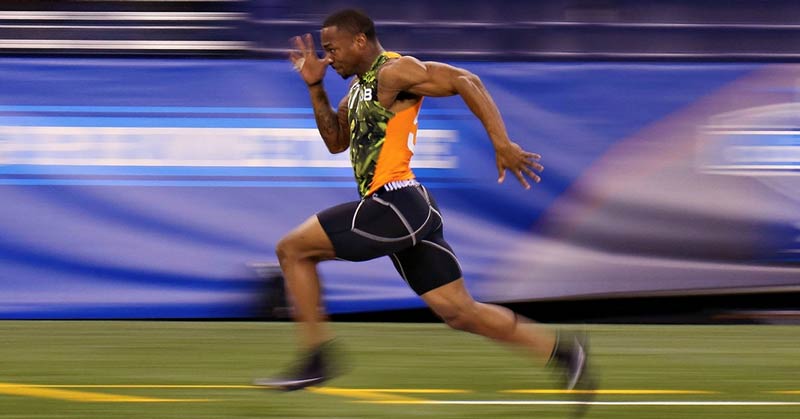
I believe the majority of football players practice in a constant state of fatigue. Too many sprinters have the same experience in track. If you are interested in learning about sprinting as a skill instead of a location on a chromosome, come to TFC-4.

A Pooling of Resources and a Clash of Ideas
Don’t expect repetitive presentations. Expect a clash of ideas. Chris Korfist and Stuart McMillan are terrific sprint coaches, but they may be from different planets. At TFC-4, we welcome dissent.
I am the oldest presenter at age 57. Blake Selig, who just graduated from UCLA, is the youngest at age 22. Chris Korfist of Slow Guy Speed School is the most unique clinic speaker in the country. We have Josh Bonhotal, the Director of Sports Performance for the Purdue men’s basketball team. Five high school football coaches will talk. Three Californians will speak: Black Selig, Joel Smith of Just Fly Sports, and Coley Candaele of Vista Murrieta High School.
John O’Malley, who coached Sandburg High School to a 7:37.36 4×8, will also talk. O’Malley coached Lukas Verzbicas, who owns a 3:59.71 mile in high school. Alec Holler will share the training methods he used coaching the Illinois 2016 high hurdle champion Travis Anderson (13.59). Dan Fichter of WannaGetFast and Irondequoit High School (New York) will present at his 4th TFC.

Living in the information age, we have the opportunity to read countless articles and watch videos until our eyes glaze over. But reading and watching videos represent passive learning.
The best learning happens when we are in action, when we are in the middle of a clash of ideas. We learn when we are interacting directly with those who have something to say.
Find a championship program and visit a practice. Take a respected coach out for breakfast. Drink a beer with a coach and argue with him. Be an active learner. Attend TFC-4.

Reflexive Performance Reset
Reflexive Performance Reset™ (RPR™) is a system that athletes and coaches can use to address pain, flexibility, and performance immediately. RPR was a part of our first three consortiums. Those who attend TFC-4 will have the opportunity to participate in four RPR sessions. This year, all breakout sessions will be available in a video package so attendees will have access to every missed presentation.
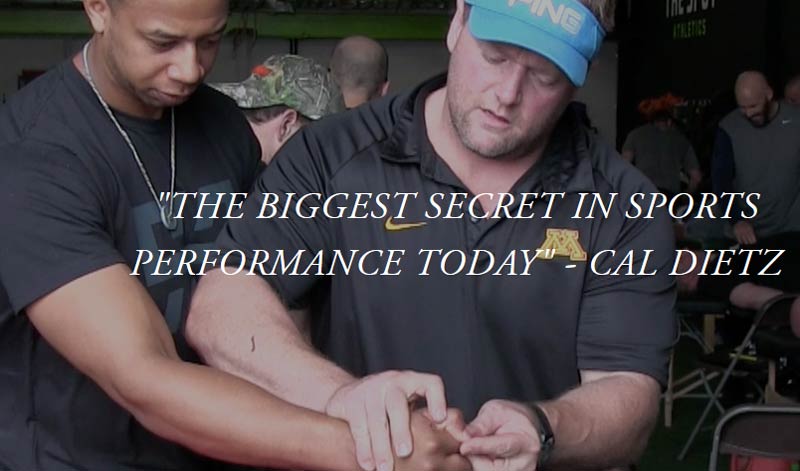

Football Coaches: Evolve or Perish
Charles Darwin taught us about natural selection. Football coaches instinctively understand the need to win football games. The career of a losing football coach will be painfully short.
Despite the proliferation of entrepreneurial 7-on-7 and personal trainers, track and field remains the gold standard for verifying football talent. Running track improves football’s most paramount skills. Teams with speed and power win games.
Track and field remains the gold standard for verifying football talent. Share on XMark Branstad of Tracking Football reports, “Make no mistake, the dozens of D1 football coaches and recruiting coordinators we’ve met and spoken to ALL say they prefer multi-sport athletes over specialization. They ALL say they look at track data on recruits and discuss how it equates to football.”
If you want to survive, take a look at the top of the food chain. What can we learn?
The Minnesota Vikings entered this season without their starting quarterback, Teddy Bridgewater. In their second game, the Vikings lost the best running back in the NFL, Adrian Peterson. Shocking the world, the Vikings have opened the season at 5-0, the only undefeated team in the NFL at the time of this writing. Defensively, the Vikings look to be the best in the NFL. Some are comparing them to the 1985 Chicago Bears. What makes the Vikings defense so special?
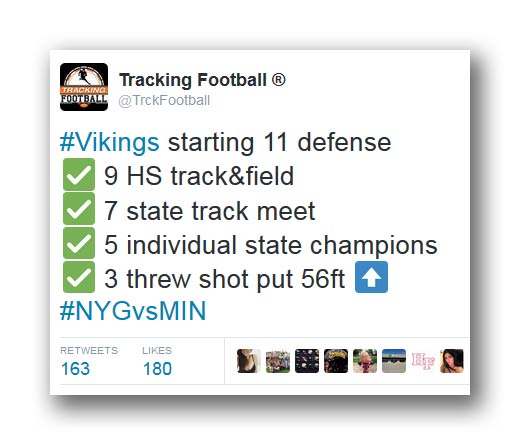
So the NFL loves track athletes. How about NCAA football? Alabama is 6-0 and ranked number one at the time of this writing. Does Alabama have track cred?
Here is the breakdown of Alabama’s twenty-two starters for their October 8th 49-30 win over Arkansas according to Tracking Football.
- 17 high school track & field athletes
- 8 offensive starters ran track
- 9 defensive starters ran track
- All 4 starting defensive backs ran track
- 2 of starting defensive backs were track state champions (Fitzpatrick & Humphrey)
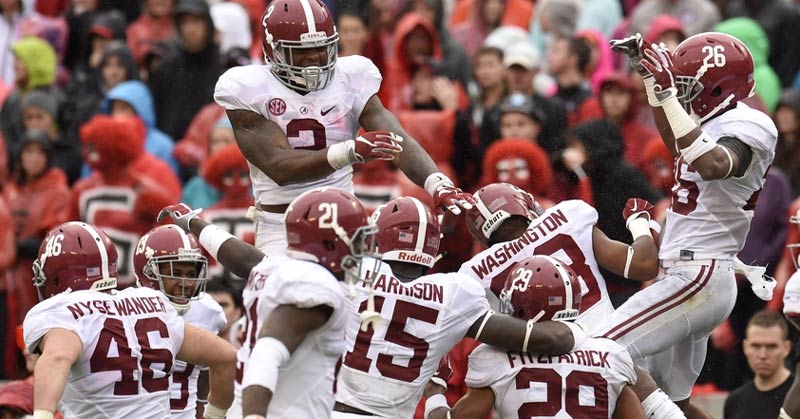
When looking at high schools, I chose to look at the best state based on total FBS recruits (big time scholarship football athletes). Texas, of course, is number one with 1,263 recruits in the past three years (421 per year). Florida was close with 1,204. California had 994.
Do the elite football players in the best football state in the US run track? The answer is yes. An overwhelming 72.9% of the 1,263 football recruits from Texas ran track.
Even though we’ve had coaches from over twenty states attend our consortiums, most of our audience comes from Illinois. Is football the same in Texas and Illinois?
- FBS Recruits Last 3 Years: Texas 1,263, Illinois 243
- Percent of Recruits Running Track: Texas 72.9%, Illinois 44.9%
Thanks to Mark Branstad from Tracking Football for providing these statistics.
The connection between track and football is indisputable. Speed and explosive power are the common threads of both sports.
It’s not enough to simply say, “Speed is a critical skill for football players” or “Sprinters need to improve their speed.” You can repeat the phrase “play fast” hundreds of times without changing the speed of your athletes.
How do you develop speed? How do you practice during the week so your team can play fast on Friday night? If speed is your prime objective, what does strength training look like in the weight room?
At TFC-4 we’ll pool our resources and find some answers. Then we’ll question the answers until we discover what works.
Track Football Consortium IV will be held on December 2nd and 3rd at Hinsdale High School, less than fifteen miles from both O’Hare and Midway Airports. For more information, go to TrackFootballConsortium.com and sign up today.
Since you’re here…
…we have a small favor to ask. More people are reading SimpliFaster than ever, and each week we bring you compelling content from coaches, sport scientists, and physiotherapists who are devoted to building better athletes. Please take a moment to share the articles on social media, engage the authors with questions and comments below, and link to articles when appropriate if you have a blog or participate on forums of related topics. — SF
[mashshare]

